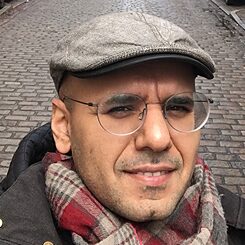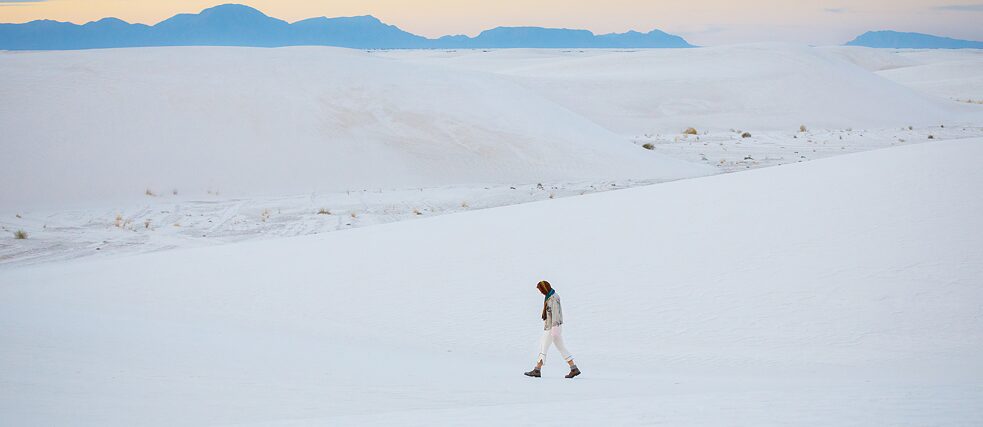“The Big Ponder”
The Great Pondering
In the podcast “The Big Ponder” initiated by the Goethe-Institut Washington, authors use personal stories to explore what connects, separates or even surprises Germany and the USA. “The Latest at Goethe” spoke with Bilal Qureshi, one of the podcast authors.
Another podcast? Do you really think that's a good idea?
 Bilal Qureshi | Photo (detail): © Bilal Qureshi
Bilal Qureshi: Radio has always been a medium of intimacy, conversations, and creative production and it’s great to know it has found its way to relevance in a new generation. That said, I hope there is still space for the kind of radio I love to hear and to create … one that requires editing, composition, and consideration. As with any project, one hopes one’s own contributions can simply forge a meaningful connection with an audience, and invite audiences to travel, to imagine and to listen, as great radio always does.
Bilal Qureshi | Photo (detail): © Bilal Qureshi
Bilal Qureshi: Radio has always been a medium of intimacy, conversations, and creative production and it’s great to know it has found its way to relevance in a new generation. That said, I hope there is still space for the kind of radio I love to hear and to create … one that requires editing, composition, and consideration. As with any project, one hopes one’s own contributions can simply forge a meaningful connection with an audience, and invite audiences to travel, to imagine and to listen, as great radio always does.
“The Big Ponder” explores abstract concepts and phenomena through personal radio essays. What will be your personal approach to the topic of your first episode, “Wanderlust”?
Bilal Qureshi: As many can relate, the past year of stillness has created both challenges and creative opportunities. As I began thinking about this wonderfully evocative concept of “Wanderlust” – more potent than ever in a year without travel – I was inspired to dig into my own sound archives from past journeys to compose a sonic love letter to wanderlust and to the art of traveling more broadly. I hope the resulting piece is both a journalistic exploration of how the travel industry has changed since the German Romantics began their walks into the woods … and yet also a pleasurable and personal journey through sounds that remind us of travels past, present, and future. As a radio professor once told me, radio is a visual medium, in which listeners create their own images and I approached this essay as an opportunity to travel through places through the power of sound and conversations.  ‘Wanderlust’ in the White Sands National Park New Mexiko | Photo (detail): © Yassine El Mansouri 2020
Each topic of “The Big Ponder” will be explored from a transatlantic perspective. Regarding the longing to travel, what's the difference between the US and Germany?
‘Wanderlust’ in the White Sands National Park New Mexiko | Photo (detail): © Yassine El Mansouri 2020
Each topic of “The Big Ponder” will be explored from a transatlantic perspective. Regarding the longing to travel, what's the difference between the US and Germany?
Bilal Qureshi: As an American, the German longing for elsewhere feels somehow more potent and more philosophical in my experience – expressed in language, art, and the flourishing travel pages of newspapers. European travel in general allows for more cultural immersion across national borders and also access to the world beyond. Perhaps this means Germans can travel more easily to destinations in Africa and Asia than is realistic for most Americans. Certainly the longer vacation schedules also make that easier as does the desire to escape the harsh winter. That said, the desire to wander, to explore, and to pursue the open horizon is a quintessentially American concept as well, even if it is historically and artistically focused on the vastness of the American continent itself. While the longing takes different inflections and express themselves differently, I think both societies share in the human affliction known as wanderlust.
You are an alumnus of the Atlantik-Brücke, and during a Robert Bosch Fellowship you lived in Germany. The topic of your second episode for “The Big Ponder” will be “friendship”. How would you assess the situation of the German-American friendship in general?
Bilal Qureshi: I certainly think the political rifts at the national level are more pronounced than they were during my time in Germany during the Obama administration. That said, I think as the world becomes even more interconnected – expressed in global streaming television, art and ideas – there are new ways for transatlantic relationships to be renewed and revitalized in ways that build on the postwar friendship. Through fellowship programs and opportunities like this wonderful transatlantic radio series honest conversations can return to the foreground. As I hope to explore in my upcoming piece, meaningful and recurring conversations are the heart of enduring friendships – personal and national – and allow us to understand both the differences and the common experiences we share.
 Bilal Qureshi | Photo (detail): © Bilal Qureshi
Bilal Qureshi: Radio has always been a medium of intimacy, conversations, and creative production and it’s great to know it has found its way to relevance in a new generation. That said, I hope there is still space for the kind of radio I love to hear and to create … one that requires editing, composition, and consideration. As with any project, one hopes one’s own contributions can simply forge a meaningful connection with an audience, and invite audiences to travel, to imagine and to listen, as great radio always does.
Bilal Qureshi | Photo (detail): © Bilal Qureshi
Bilal Qureshi: Radio has always been a medium of intimacy, conversations, and creative production and it’s great to know it has found its way to relevance in a new generation. That said, I hope there is still space for the kind of radio I love to hear and to create … one that requires editing, composition, and consideration. As with any project, one hopes one’s own contributions can simply forge a meaningful connection with an audience, and invite audiences to travel, to imagine and to listen, as great radio always does.“The Big Ponder” explores abstract concepts and phenomena through personal radio essays. What will be your personal approach to the topic of your first episode, “Wanderlust”?
Bilal Qureshi: As many can relate, the past year of stillness has created both challenges and creative opportunities. As I began thinking about this wonderfully evocative concept of “Wanderlust” – more potent than ever in a year without travel – I was inspired to dig into my own sound archives from past journeys to compose a sonic love letter to wanderlust and to the art of traveling more broadly. I hope the resulting piece is both a journalistic exploration of how the travel industry has changed since the German Romantics began their walks into the woods … and yet also a pleasurable and personal journey through sounds that remind us of travels past, present, and future. As a radio professor once told me, radio is a visual medium, in which listeners create their own images and I approached this essay as an opportunity to travel through places through the power of sound and conversations.
 ‘Wanderlust’ in the White Sands National Park New Mexiko | Photo (detail): © Yassine El Mansouri 2020
‘Wanderlust’ in the White Sands National Park New Mexiko | Photo (detail): © Yassine El Mansouri 2020
Bilal Qureshi: As an American, the German longing for elsewhere feels somehow more potent and more philosophical in my experience – expressed in language, art, and the flourishing travel pages of newspapers. European travel in general allows for more cultural immersion across national borders and also access to the world beyond. Perhaps this means Germans can travel more easily to destinations in Africa and Asia than is realistic for most Americans. Certainly the longer vacation schedules also make that easier as does the desire to escape the harsh winter. That said, the desire to wander, to explore, and to pursue the open horizon is a quintessentially American concept as well, even if it is historically and artistically focused on the vastness of the American continent itself. While the longing takes different inflections and express themselves differently, I think both societies share in the human affliction known as wanderlust.
You are an alumnus of the Atlantik-Brücke, and during a Robert Bosch Fellowship you lived in Germany. The topic of your second episode for “The Big Ponder” will be “friendship”. How would you assess the situation of the German-American friendship in general?
Bilal Qureshi: I certainly think the political rifts at the national level are more pronounced than they were during my time in Germany during the Obama administration. That said, I think as the world becomes even more interconnected – expressed in global streaming television, art and ideas – there are new ways for transatlantic relationships to be renewed and revitalized in ways that build on the postwar friendship. Through fellowship programs and opportunities like this wonderful transatlantic radio series honest conversations can return to the foreground. As I hope to explore in my upcoming piece, meaningful and recurring conversations are the heart of enduring friendships – personal and national – and allow us to understand both the differences and the common experiences we share.



